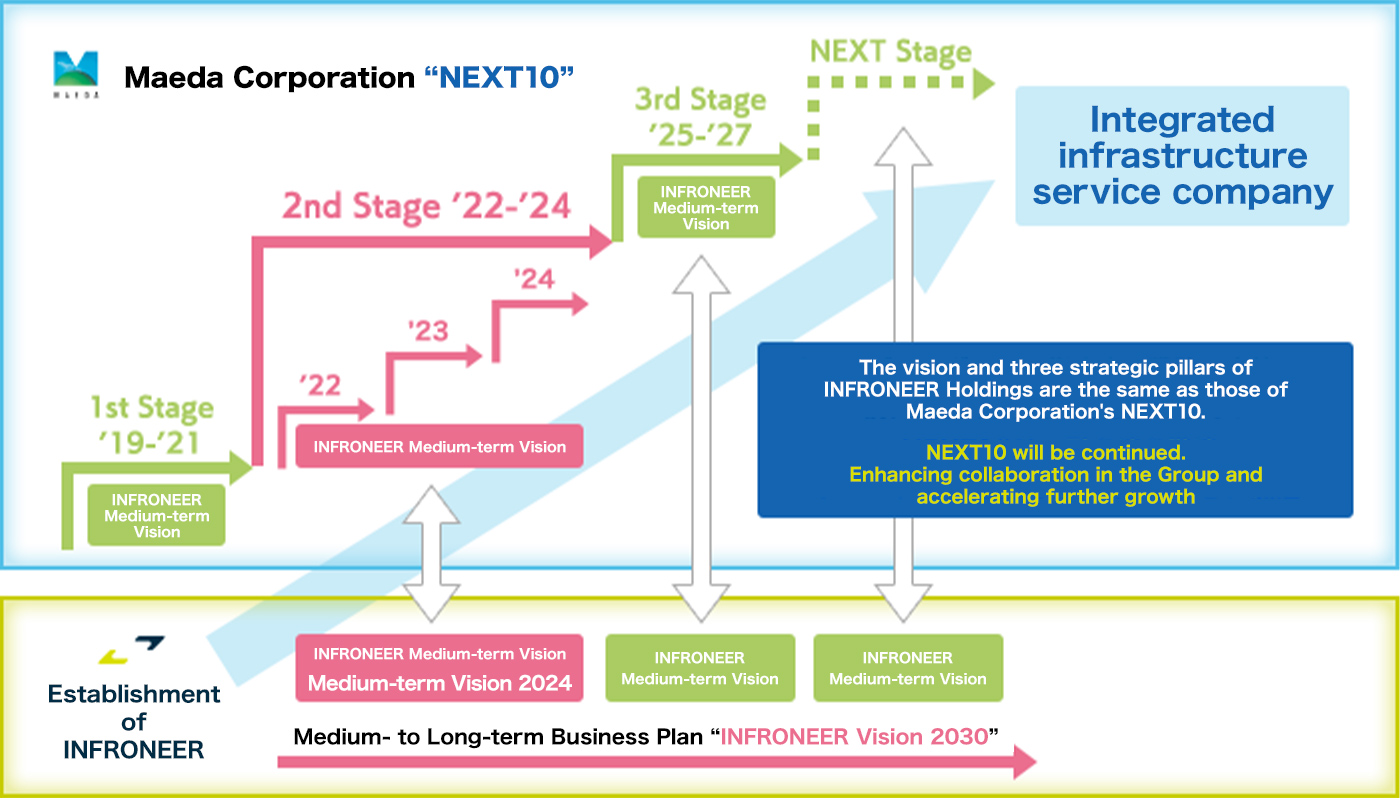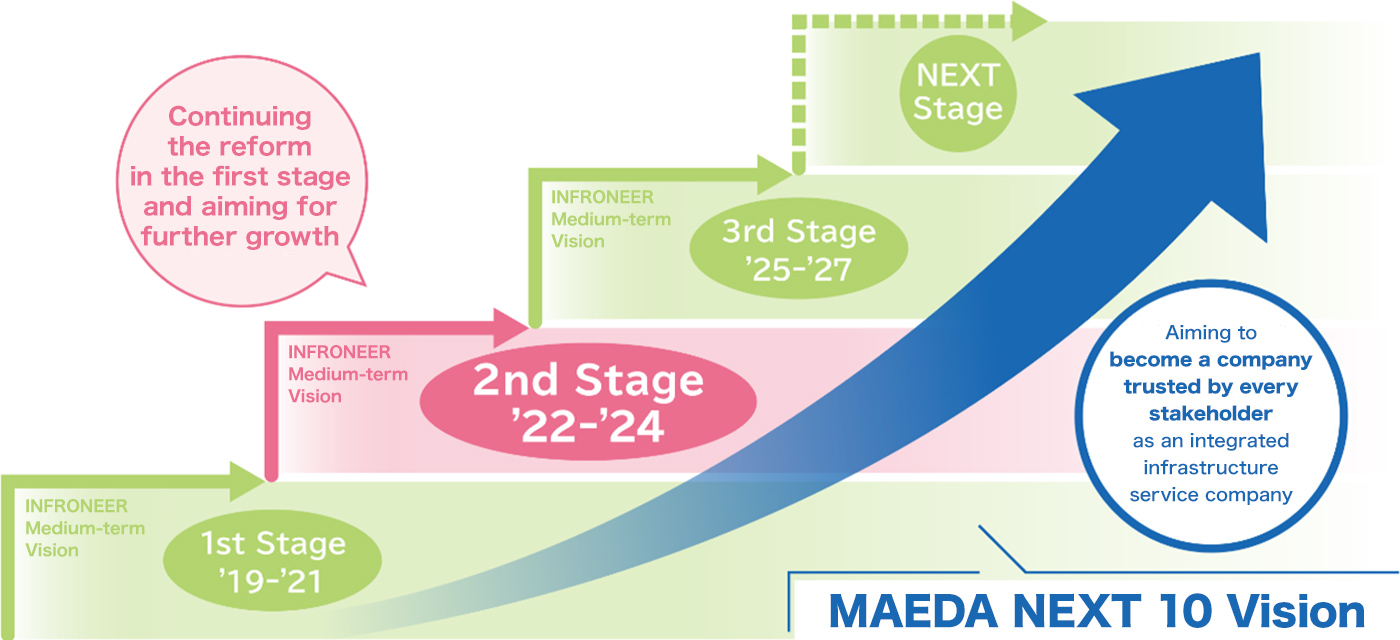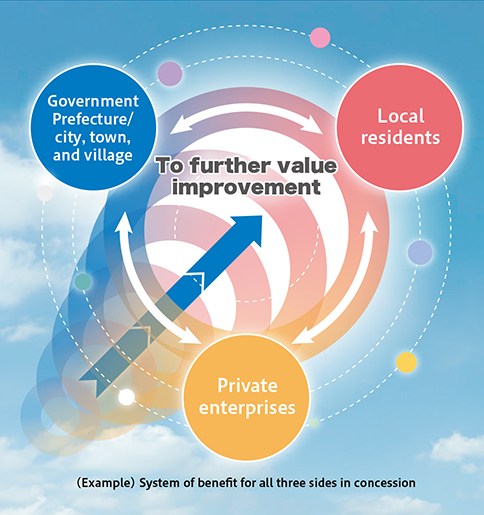Feature Story What is the value creation in CSV that MAEDA desires?
Current 2nd stage of NEXT10
In 2019, we marked the 100th anniversary of the founding of Maeda Corporation and set up “NEXT100,” a vision for the next 100 years, aiming for a new corporate form of MAEDA by continuous implementation of CSV management. As a milestone for addressing this new challenge, we formulated the vision to be realized in the next 10 years in “NEXT10.” Then, by the backcasting method, we formulated the roadmap into which the vision was put into the INFRONEER Medium-term Vision for each of the three stages and three strategic pillars to achieve NEXT10.
Three strategic pillars to achieve the vision in “NEXT10”
- Ⅰ.Productivity reform
- Ⅱ.Company-wide promotion of the “de-construction” business
- Ⅲ.Improvement of corporate culture

In 2021, we shifted to the holdings structure with INFRONEER Holdings Inc. as a joint holding company and Maeda Corporation, Maeda Road Construction Co., Ltd. and Maeda Seisakusho Co., Ltd. as business companies. With this structure, we will further improve the corporate value and continue Maeda Corporation's NEXT10 in the form of linking it with the newly formulated INFRONEER's business strategy. In the second stage of FY2022 to FY2024, we will increase efforts with the maximization of Group synergy in mind in addition to conventional efforts and accelerate further growth.
For “productivity reform,” in the first stage, we introduced “value added productivity” as a new management index and could achieve the goal on the whole by fully implementing profit management and working hours management.
In the second stage as well, aiming for a further improvement of the value added productivity, we will actively work on the reduction of workload by promotion of BIM/CIM and utilization of ICT tools, etc.
For “company-wide promotion of the “de-construction” business,” by utilizing our expertise as a pioneer of private-public initiative and the sales operation system of the INFRONEER Group, we are steadily increasing the number of projects and the number of municipalities with which our company has connections. In the second stage, we will further enhance collaboration in the Group and also cooperate with domestic and foreign partners, aiming for further expansion of the “de-construction” business.
Finally, for the “improvement of corporate culture,” aiming to create a strong organization that enables each employee to work with a sense of ownership and independence, in the first stage, we established a foundation for establishing a new corporate culture by drastically reforming our personnel system and developing and implementing an unprecedented educational program. In the second stage as well, we will keep reviewing the system, program, etc. and at the same time visualize and monitor the investment in human resources to enhance training and support for ease of work.

The view of challenge solving created with stakeholders

The image MAEDA aims for in “NEXT10” is an “integrated infrastructure service company.” This is a business model to be realized by the fusion of the “engineering capability,” which we have cultivated in the construction business, and the “new construction service,” which we have built up in the “de-construction” business.
We solve various social challenges centered on infrastructure by expanding and reinforcing business fields around construction to its upstream, business investment or development, and its downstream, operation or maintenance management. In other words, we aim to solve identified materiality in all directions.
Each employee has an employer’s perspective based on a “de-construction” mindset, is independently faced with changes in the world and social challenges, and proposes and creates new values. This is the epitome of practicing CSV management.
In addition, MAEDA thinks that expanding cooperation with stakeholders further is essential to solving various social challenges in the future.
This feature story reports the value creation in CSV that MAEDA desires.
Feature Story 1 describes the aim of maximizing the added value in the strategic efforts undertaken in NEXT10. This feature story regards added value as “one of the indices indicating created economic value.” We think that distributing economic values created by efforts to maximize added values for stakeholders and carrying them out by the scheme of dividends for the earth also leads to creating social and environmental values.
Regarding the efforts on which Feature Story 2 focuses, such as concession business and comprehensive management outsourcing, there are various challenges and future visions depending on the region. Therefore, more approaches are required to solve challenges by expanding the relationship based on the cyclical model involving various stakeholders.
In this model, people, goods, services, and others move by investing enterprises’ technology and business capability in stakeholders rooted in a region, such as industry, culture, and sport, and profits circulate directly or indirectly. In addition, the scheme increases the chain of value by enlarging the circle by bringing in various stakeholders and aims to revitalize the whole region.
Values are further created in CSV, and enterprises can continue to circulate profits. On the other hand, stakeholders can also expect sustainable growth by creating values.
Therefore, we recognize that this view can be a model for a sustainable region.
Feature Story 3 is about collaboration in the Group which we aim to enhance especially in the 2nd stage of NEXT10.
The project of the MAGARIKAWA circuit highlighted in this feature story is a typical example in which the entire Group cooperated and the synergies of the three companies were generated. We will continue the strengthening and implementation of “construction” which is a strength of our company and also promote further strengthening of collaboration in the Group and acceleration of the reform.